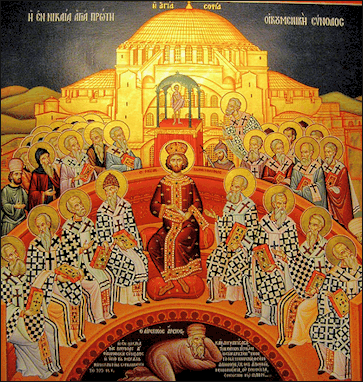With two introductory episodes on the Creeds under our belt, sash, or whatever else you use to hold up your pants, let’s move now to the Council & Creed of Nicaea.
What’s referred to as the Nicene Creed is the product of not one, but two councils held about 60 yrs apart. The first was held in the city of Nicaea in 325, the other in Constantinople in 381. The 2 cities are about 140 kms or 86 mls apart. The Nicene Creed may be the most famous in Church history because it addressed the issue of the Trinity; that is, how Christians worship one God Who reveals Himself in three-persons; Father, Son, And Holy Spirit. The Nicene Creed was the first to obtain the imprimatur of authority over all churches.
It happened thus . . .
As we covered in Season 1, about the year 318, an elder in the church of Alexandria named Arius, began teaching as fact something earlier Christians had vehemently rejected; that Jesus wasn’t God. A clever & persuasive speaker, Arius said Jesus was a kind of special agent from God, but that the Father alone was fully God. Arius pointed to the limitations of Jesus’ humanity as proofs He wasn’t God, for according to his logic, humanity and deity simply cannot co-exist.
Arius laid claim to the theology of Origen in the previous century as a basis for his views. But in a recent episode, w e saw that Origen did go off into much wide ranging speculation in his work. So pinning a doctrine as important as the identity of Christ Origen is problematic.
Alexander, Arius’s own bishop, that is the lead pastor of the church there in Alexandria, disagreed with his elder’s teaching. And he did so with devastating logic. Alexander went ahead and used Origen’s own writings to prove that even by that standard, Arius’ conclusions about Jesus’ nature weren’t supported by Origen. Origen had said that the title “Father” is an eternal attribute of God. Since it’s not possible to be a father without having a parental relationship, the fact God is eternally a father means He eternally has a son. Then Alexander lowered the boom & pointed out that God is perfect. Perfection means the inability to change. Because if you’re already perfect, any change would have to be away from perfection. So how could God change from not being a father to being a father? Arius’ attempt to exalt the Father in fact denigrated him.
Those old dudes were smart!
Despite Alexander’s annihilation of Arius’ position, Arius continued to propagate his error. He was able to because his explanations of his ideas were simple and appealing while the logic of his opponents like Pastor Alex were opaque and heavy; less appealing to the common man.
But Arius’ arguments ended up not so much centered on Origen as it was a debate about Scripture. At places, Jesus did seem to say He was subordinate to the Father. Yet other passages made it clear Jesus claimed to be both divine and equal with the Father. The challenge these early church leaders faced was how to maintain that Christians are dedicated monotheists, that is, worshippers of one God, while at the same time saying the worship both God the Father & God the Son? That wasn’t just a problem they had 2000 yrs ago, people ask it today. For reasons that we chart in Season 1 when we covered this, Arius’ ideas spread rapidly and ended up co-opting a large number of church members, and a few church leaders. But as Arius’ popularity rose, so too did the opposition against him. The refutation of his teaching became more sophisticated & effective. The controversy grew and threated to tear the church apart.
Well, that just wasn’t going to do for the new Emperor Constantine, a convert to the new and emerging Faith. The previous administration of the Roman Empire had sought to brutally eradicate the Church once and for all, but had failed miserably. In a question historians will debate forever, when Constantine became emperor, he moved to lift the official ban on Christianity. Was he a genuine convert, or was he merely a savvy political operator who read the direction the way the cultural winds were blowing and decided to make common cause with the Christians? Historians line up on both sides of that; each with supporting evidence. Whatever Constantine’s personal motivations and beliefs, he was a brilliant leader who recognized the force for unity a healthy church could be. So he used his influence as Emperor to call for a meeting of all church leaders to definitively deal with the challenge presented by Arius. He convened what’s called the first ecumenical, that is, fully representative, universally recognized council of the Christian church.
Modern critics have a penchant for exaggerating Constantine’s role in the council. They make it seem as though the Emperor acted as the main theologian & religious authority whose influence shaped the Christian Faith for centuries to come. Contrary to the sniping of scoffers, Constantine did not wave his scepter and declare Jesus God by royal fiat. He did not decide which books were in and out of the Bible.
During the early 320’s the Church in Spain was being troubled by the Arian Controversy. In a special conference of church leaders at Eastertime, they decided something needed to be done and charged one of their leaders, the bishop of Cordoba, to request that the Emperor convene a wider council.
So in May of 325, Constantine sent out an invitation to all 1800 pastors of the Church; a thousand in the East & 800 in the West, to attend the council at Nicaea. Numbers vary but come in at around 300 who made it. The Council began on May 20th & ended on August 25th.
Bishop Alexander from Alexandria along with one of his elders, Athanasius, led the Anti-Arian party at Nicaea. The Arians laid out their case, which sounded solid, until it was reviewed by the other side, which simply annihilated their position with logic and Scripture. Those church leaders who’d leaned toward Arianism realized it’s numerous errors and swiftly jumped ship. When the vote was taken, only Arius and 2 bishops voted to reject Arianism. Constantine then sent the 3 into exile. Within a short time, both the other bishops were shown the fallacies of Arius’ teaching and wrote letters recanting their position, asking to be reinstated as members in good standing in the Church.
It behooves us to read the Nicene Creed. BTW, this is the final form of the creed as it was later finessed.
I believe in one God, the Father Almighty, Maker of heaven and earth, and of all things visible and invisible.
And in one Lord Jesus Christ, the only-begotten Son of God, begotten of the Father before all worlds; God of God, Light of Light, very God of very God; begotten, not made, being of one substance with the Father, by whom all things were made. Who, for us men and for our salvation, came down from heaven, and was incarnate by the Holy Spirit of the virgin Mary, and was made man; and was crucified also for us under Pontius Pilate; He suffered and was buried; and the third day He rose again, according to the Scriptures; and ascended into heaven, and sits on the right hand of the Father; and He shall come again, with glory, to judge the living and the dead; whose kingdom shall have no end.
And I believe in the Holy Spirit, the Lord and Giver of Life; who proceeds from the Father and the Son; who with the Father and the Son together is worshipped and glorified; who spoke by the prophets. And I believe in one holy catholic and apostolic Church. I acknowledge one baptism for the remission of sins; and I look for the resurrection of the dead, and the life of the world to come. Amen.
The Nicene Creed reflects the Council’s concern to address Arianism when it says the “Lord Jesus Christ” is “Son of God, … begotten of the Father,” & His “only-begotten.” These are all assertions drawn directly from Scripture itself. Jesus, the Creed declares is “God from God.” The Creed even includes an analogy at this point when it says Jesus is Light of Light.” How can you separate light from light? This was a classic example in early Christian writing, which links God to the Sun & its rays. The sun can no more be separated from its rays than the Father can be separated from the Son, S-O-N. The Creed repeats that Jesus is “very God of very God.” He’s neither made nor created, nor is He a product of the true God. Jesus IS the true God.
Athanasius reports that up to this point in the development of the Creed, the Arians were still on board. He describes them as snickering to one another that there wasn’t anything in the Creed yet that was a deal buster. It’s like they had a trump card they knew they could play and hadn’t heard anything that would take it from them. Since the Anti-Arians knew the Arians held to a heretical tenet, they realized more needed to be stated to draw the line, even if it wasn’t directly tied to Scripture. Something was needed that would settle once and for all that the deity of Father & Son are the same. They settled on the phrase that Jesus is eternally “of one substance with the Father.” That did it. That broke the Arian claim on orthodoxy. They couldn’t; hang with that and were forced to admit they deviated from standard Christian belief. The Council affirmed that the Father is not “more God” than the Son.
The Council was mainly focused on parsing the language regarding the nature of Jesus, so the original creedal statement said little about the Holy Spirit. It was then upgraded by the Council of Constantinople 60 yrs later to bring in an emphasis on the deity of the Holy Spirit as well.
The Nicene Creed is Trinitarian. But it doesn’t elaborate on a clearly defined Trinitarian formula. That will be dealt with by later councils.
Because The Nicene Creed is a part of the liturgy of many churches today, it’s familiar to Christians across the globe. It captures the essence of the Gospel in a short, but packed summary. It describes a triune God, who comes to an alienated humanity in the person of Jesus, the God-man Whose atoning work restored mankind to the destiny God originally planned.
In contrast to earlier creeds, the Nicene Creed delineated a doctrinal minimum of Christian belief. Church leaders had learned by unfortunate experience there were areas in the earlier “rule of faith” that left too much open to interpretative creativity that took people into aberrant realms. Arius was just one case in point. The fact that both Jesus and the Holy Spirit are as much God as the Father is a nonnegotiable part of Christianity because it’s firmly rooted in the revelation of Scripture. Church leaders came to the solid conviction that God WANTS His people to know Him as one God, eternally manifest in 3 persons. As subsequent history proved, the wording of the Nicene Creed may have solved one problem, but it stirred up others later councils would address. After Nicaea, Christians may not have had to a precisely detailed Trinitarian theology to be considered saved, but they atr least needed to have the outline described by the Creed in place.
Once Jesus’ and the Spirit’s deity were affirmed the question was, “What then is the relationship of the persons of the Godhead? And if Jesus is both God & man, how are we to understand Him in terms of His nature? Is there a percentage of God to man; a ratio? Is He 50-50, 100-100, 75-25? Or what?.
It’s always dicey playing “what if” with history, but then, some of my favorite novels are of the alternate history genre. If Arianism had been allowed to hijack Christianity, and Jesus ended up being regarded as some kind of lesser deity, there’s a good chance The Faith would have ended up being gobbled up by the polytheistic paganism of the Empire. The work of Christ in accomplishing atonement would have been rendered inert. No One less than God the Son, Who was also fully human, could sufficiently mediate a reconciliation between God and man & redeem a fallen creation. As Athanasius later wrote, only the Creator could enter & fix a busted creation, restoring it to its original purpose. He’s the one who used a word around which later controversy would swirl, when he said that the Father & Son are of one substance = the word he used in Greek was homoousios.
Arianism wasn’t the only thing the Council addressed. They also handled the question of the timing of celebrating the Resurrection of Christ. They swiftly dealt with the challenge presented by an Egyptian bishop named Meletius. Meletius was pastor of the church in Lycopolis. He’d fomented a schism over the issue of how to handle lapsed Christians. I’ll leave it to you to listen to the episode we did on this is Season one called The Lapsed Dance. Meletius was of the Donatist mode; He refused to serve communion to repentant Christians who’d caved under the threat of earlier persecution, though the Church at large had decided to welcome them back into fellowship.
At Nicaea, Meletius was condemned and all clergy he’d ordained were instructed to secure ordination from orthodox bishops.
Finally, several matters regarding how to conduct church administration were discussed and defined in 20 rulings called canons. These dealt with such issue as . . .
What process the repentant-lapsed had to go through to demonstrate the sincerity of their repentance.
How to restore repentant heretics and schismatics and whether or not they should or could be returned to a role in leadership.
The role of deacons was discussed.
As well as basic liturgical practices, like whether people ought to standing or kneel when praying.
The organizational structure of the Church was discussed.
And behavioral standards for clergy were settled.
And à That’s IT!
There was no discussion about what books belong in the Bible.
Constantin’s role in the Council was minimal. Beside using his authority as Emperor to summon it, he had little influence in it’s decisions. He paid the attendees travel expenses and provided a place for them to meet. He opened the Council with an exhortation that they strive for unanimity by addressing the issues of debate from the Scriptures.
Once the Council settled the theological issues raised by Arius, Constantine used his civil authority to enforce the heretics exile.
So all the hullabaloo about the Emperor’s political manipulation of the Council to secure some theology that was utterly foreign to primitive Christianity is a pile of steaming compost.






LOL!!! That last bit about the “so-called” influence of Constantine over the Council? Well, let’s just say that had to be the most creative literary “slam-dunk” I’ve ever heard! Well played, Sir Lance; well played. ?
Thanks Lem. ‘Twas fun
Lance, do you think you could go over early Church heretics in more detail just like the creeds? You briefly went over some “heretical beliefs” in the episodes about the First Century, but it would be interesting if sometime in the future you could expand on those heretics.
Yes, have given that some thought and might do that.